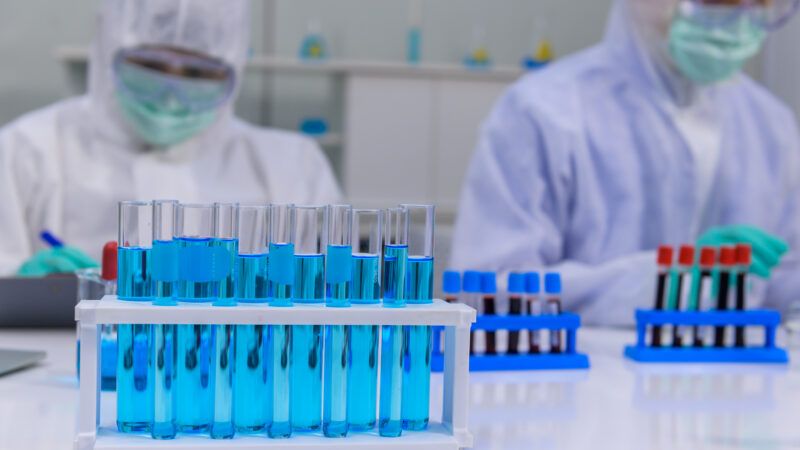The Lab Leak Theory Still Counts as Misinformation in a New Study of COVID-19 Claims
A new study of COVID-19 narratives makes the very mistake it purports to correct.

A new study published by The Journal of the American Medical Association purports to track the spread of COVID-19 misinformation during the course of the pandemic, and largely blames 52 specific doctors for promoting allegedly incorrect claims about the virus, masks, and vaccines.
The authors of that study, "Communication of COVID-19 Misinformation on Social Media by Physicians in the US," might need to double-check their own grasp of the facts, however. Several statements they describe as examples of misinformation are debatable, and one big claim cannot possibly be described as misinformation at all: the lab leak theory.
Statements counted as misinformation included the notion that "the virus originated in a laboratory in China." The authors, as if anticipating strenuous objection to this, weakly insist that the lab leak theory "contradicted scientific evidence at the time." But this gets to the very root of the problem: There was no smoking gun indicating either a natural origin or a lab leak, and yet a group of scientific experts released a paper—at the behest of federal health czars Anthony Fauci and Francis Collins—that explicitly ruled out a lab leak despite their own private concerns that this was a perfectly compelling explanation. Scientists who publicly leaned toward the lab leak theory—like Alina Chan, of MIT and Harvard—were condemned.
The lab leak theory did not "contradict scientific evidence at the time." The evidence was ambiguous, and some scientists preferred the lab leak while others preferred natural origin.
In any case, a scientific study released in August 2023 has no excuse for continuing to promote the fiction that the lab leak theory is misinformation. The theory is now endorsed by both the U.S. Department of Energy and the FBI. The Wall Street Journal has confirmed key reporting that would make the lab leak all but certain—namely, that the first people to contract COVID-19 were scientists working at the Wuhan Institute of Virology.
So-called experts who purport to chronicle and correct the category of speech now known as misinformation have proven themselves more than capable of error, which calls into question their entire project. (The authors have not responded to Reason's request for comment.)
Falsely describing the lab leak theory as misinformation is not the paper's only sin, of course. The authors also make dubious claims about masks and mandates. They cite "allegations of consequences of mask wearing included medical and social or developmental effects, all of which were unfounded."
"Many physicians focused on negative consequences related to children and mask mandates in schools, claiming that masks interfered with social development despite lack of evidence," wrote the authors.
It's simply untrue that masking children has no negative consequences whatsoever for their development. As Brown University's Emily Oster noted, "There is direct evidence that masks make it difficult to hear the speaker, and that this may be exacerbated for kids in loud classrooms."
"It stands to some logic that if you are trying to teach a young child to read—or, really, do anything—it is valuable for them to be able to hear you," she wrote for Slate. "And social interactions are better if kids can hear each other and be heard by teachers. Putting all this together, it is reasonable to think that some aspects of learning or social skills may be impacted by masks, and indeed others have argued this."
The paper also takes issue with the claim that mask mandates were ineffective at stopping the spread of COVID-19, even though some studies did in fact cast doubt on whether mandates—if not the masks themselves—were doing any good.
Lastly, the authors explicitly denounce as a conspiracy theory the idea that health officials "censored information that challenged government messaging." Yet the Facebook Files and the Twitter Files have documented the ways in which the federal government pressured social media companies to do precisely that.
Understanding how false information spreads on social media is a worthwhile project, but the authors of this paper don't seem to understand that there are legitimate disagreements on a whole host of policy issues related to COVID-19. The science is not settled; it never is. Those who would seek to police misinformation should first define it accurately, or else they are committing the very same mistake they seek to correct.


Show Comments (48)